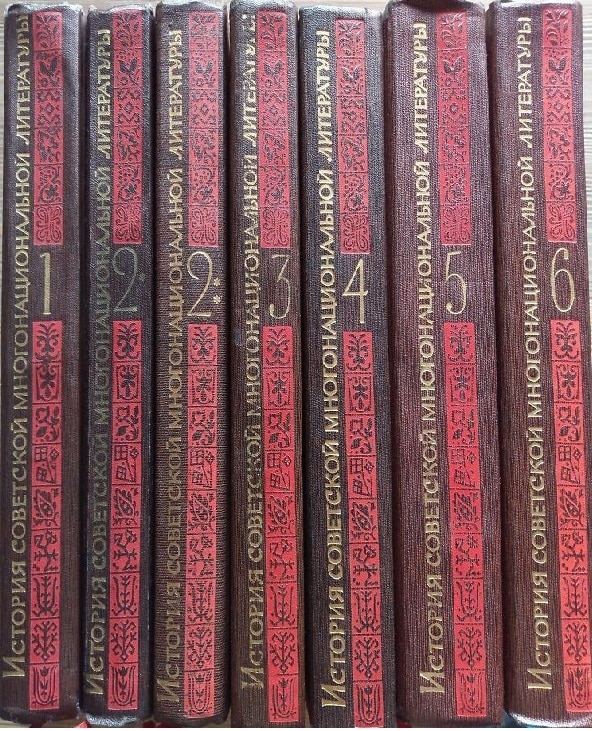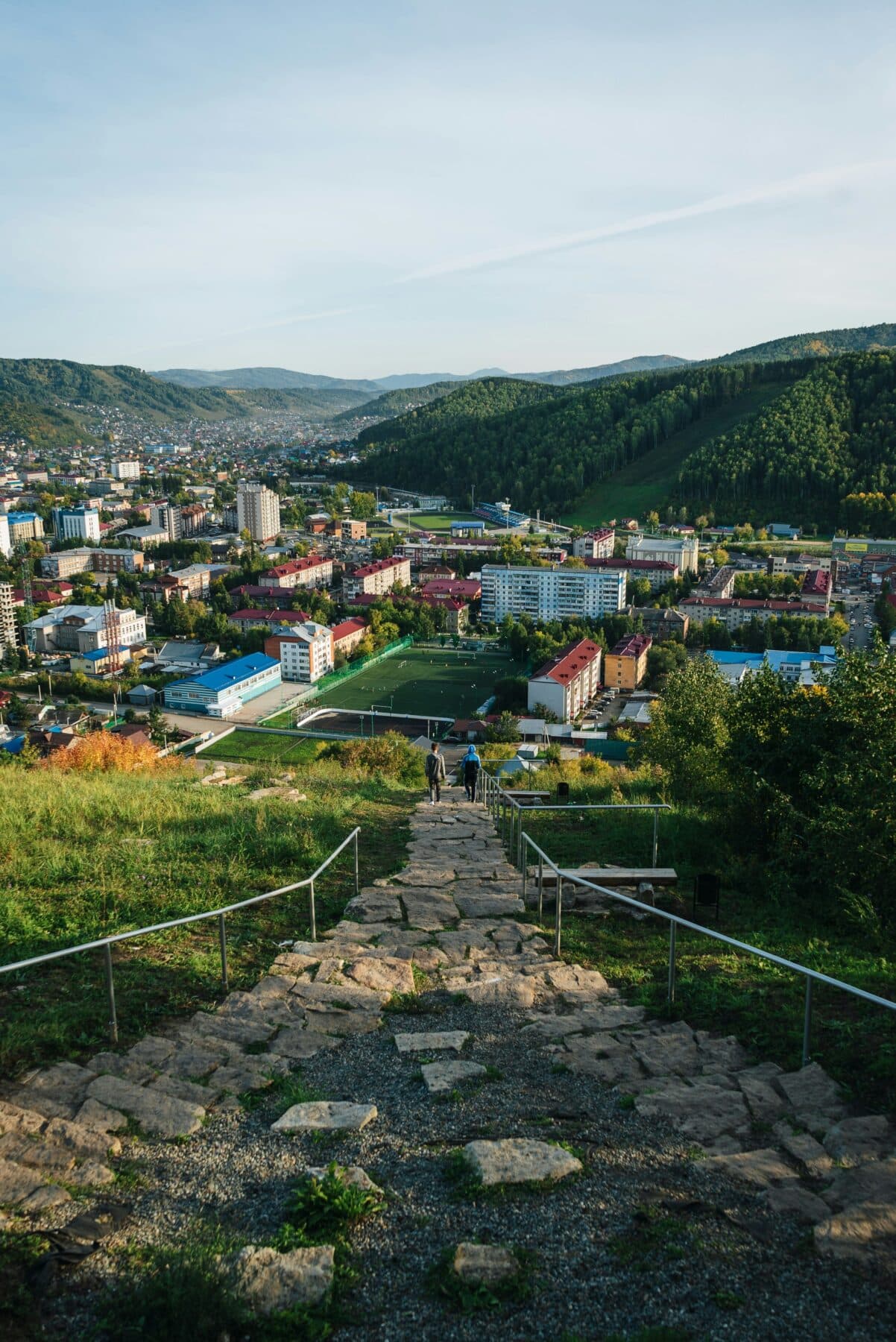
Header Photo: Gorno-Altaysk, Russia. Source: Unsplash
Although the debates about the decolonization of the humanities have gained particular urgency since February 2022 and are therefore understandably associated, first of all, with Ukrainian studies, in the Russian empire and the Soviet Union, colonialism took its most classic form in relation to smaller non-Slavic ethnic groups who were religiously and culturally different (i.e., Muslim or polytheistic) and perceived as “backward.” The question I focus on in this essay is how the colonial constellation originating in Western European ideas of enlightenment affects us today in our international academic routines and how it is perpetuated in our research practices.
A few years ago, I traveled with a group of colleagues from German universities to a conference in Gorno-Altaysk. The conference focused on cultural and ethnic identities in Siberia. Local professors and researchers received us in almost the same way as “distant” Soviet republics welcomed “metropolitan” guests from universities in Moscow or Leningrad: with honors and respect, featuring our papers in the plenary session at the very beginning of a several day-long event, and gathering colleagues from other departments and institutes to listen to us. Employees and graduate students at the Gorno-Altaysk State University surrounded me after my talk on literatures of the Soviet indigenous north and asked me excitedly how they study and what they teach “in the West.” I have never felt so important. I must confess, the papers of the local colleagues initially seemed to me, by comparison, to be of little conceptual interest: they contained a lot of pathos, were rather traditionally composed, and were somewhat reminiscent of the Soviet traditions of praising the “classics.” Over the course of the conference, however, I became increasingly impressed by these colleagues’ incredible knowledge of facts, names, and the complex relationships and history of Siberian ethnic cultures. Moreover, my conversations with the local researchers and teachers significantly complicated my own picture of the northern languages and literatures. I learned facts and contexts that I could not possibly read or hear about anywhere else, and the most “Western” research works on this topic — including my own — seemed incomplete and even simplistic to me after that.
I learned facts and contexts that I could not possibly read or hear about anywhere else.
This trip embarrassed and confused me: I could not stop thinking about our current research practices, which were the result of centuries of unequal interrelationships between “East“ and “West” and the reason for evergrowing blind spots in our academic worldview. My thoughts revolved around the fact that many of us travel to the former Soviet “outskirts” to do fieldwork, to learn the “remote” reality firsthand, and to use local expertise merely as another source of ethnographic material, such that the dialogue with this specific expertise and close knowledge remains absent from our scholarship. I asked myself: do we really have hopelessly divergent intellectual horizons, different access to theories, and irreconcilable ideas of what should be a valuable scholarly contribution in our field? We bring “natural” or “exotic” ingredients from our journeys and use them to prepare our own dishes, a kind of gentrified fusion food: is this really the contents of the books that we are working on and that win awards from prestigious professional organizations such as ASEEES? I still have no unambiguous answer to this question. Research awards and intellectual recognition are an important part of any professional community, an attempt to feature the most meaningful results and new insights and make visible what hitherto has been overseen and neglected. The problem is that this often thought-provoking and sometimes groundbreaking research is so often conducted in a context of asymmetrical epistemologies. The situation that I experienced in Gorno-Altaysk cannot be described as a desired diversity of scientific multiculturalism. It was a situation of an explicit hierarchy, of very different degrees of intellectual prominence, and of unequal distribution of symbolic capital.

As co-editor of one of the oldest and most prominent Slavic studies journals in Germany, I admit that most of the articles that we have to reject or return for major revisions come from authors from Eastern Europe and, in particular, from the former Soviet republics. The reasons for our reluctance to accept these articles for publication are quite boilerplate: insufficient familiarity with the main scholarly works on this topic, (over-)descriptiveness, lack of original theses, and biased or tendentious approaches to the subject. When I talk about this problem with my colleagues, they either shrug their shoulders (“What did you expect?“) or try to avoid this uncomfortable topic. Others talk about the need to create funding programs that enable scholars from the post-Soviet space to visit Western European and North American universities in order to “exchange experience.“ This situation reminds me of an episode in the late Soviet Union I heard about from my father. My father was a researcher at the Gorky Institute of World Literature in Moscow for many years. As soon as he joined this institution in the early 1970s, the head of the Sector of Literatures of the Peoples of the USSR Georgii Lomidze assigned him the supervision of a multi-volume edition of articles on the history of multinational Soviet literature. Literary scholars from Uzbekistan, Turkmenistan, Khanty-Mansi-Okrug, Yakutia, Buryatia, and other regions were to actively contribute to this huge project with their local expertise and sent their articles — all, of course, in Russian. As my father described, editing these texts was a great challenge and all in all a torment: they actually had to be rewritten not only because of the authors‘ insufficient Russian language skills, but also because of the apparently tendentious, non-analytical content. My father, who was interested in the semi-taboo subjects of modernist and avant-garde poetry, regrets even today having agreed to do this work (though he had no recourse to reject the task). The similarity of these two — geopolitically highly divergent — academic contexts is striking. The unequal relationship between the center and peripheries in the former Soviet empire mirrors today’s situation in the “Western” and “Eastern” academias (I use these concepts in a symbolic, rather than in a precise geographical, sense).
The debate about the decolonization of the humanities, including cultural studies, began several decades ago, long before it became the primary agenda on a transnational scale after February 24, triggered by Russia’s full-scale military attack on Ukraine. Indeed, the last two or three decades have seen an increasing number of projects and publications exploring the cultures of ethnic minorities living in past and present empires. The research lens brought to the humanities by the philosophy of (de)construction, postcolonial theory, and the spatial turn was supposed to avoid epistemological violence against the subject of our research — the temptation to deprive minority (or majority but remote) cultures of their voice. Decolonization meant and means a change in the very perspective of the analyst, now interested in the complex subjectivity and agency of ethnic communities in situations of cultural and political asymmetry. It is also an attempt, if not to overcome, then at least to negotiate and reflect on, the distance between the researcher and the individuals they research. Doubtless, this agenda has its own ethics in influential Western European and North American academic spheres: the goal being to heighten sensitivity towards the “Other,” who no longer wants to be seen only as a victim of hegemonic regimes or as an object of history, but as an individual included in alternative relations to Western-liberal social connections and able to make (albeit limited) cultural choices. Moreover, the very heterogeneity or hybridity of the “peripheral” or “small” cultures that constitute empires corresponded to our desire to challenge the dogma of political dichotomies associated with the optics, on the one hand, of structuralism, and on the other, in Sovietology, with the Cold War.

The concept of careful, dialogical research and the capacity to put into perspective one’s own position as observer and analyst of foreign cultures were an important input of Clifford Geertz’s anthropology (among others), as well as his understanding of ethnography — or rather ethnographies — as a multiplicity of narratives with their imagery, metaphors, phraseology, and voice, never transmitting universal knowledge but always dependent on our own cultural context and subjectivity. The term “thick description“ became the epitome of what is also called reciprocal or participatory epistemology today, that is, an analysis that considers the viewpoint of local people, relationships, communities, and cultural agents. The local context becomes then a participant in such an analysis and an indispensable actor within our understanding of the “Other“ or “foreign“ cultural worlds. But the ambivalent phenomenon of modernity, which researchers of empires and colonialism — starting in the 1990s also in Sovietology — criticize as a system of values imposed by European enlighteners over different cultures and that has been constructed as universal, affects not only the relationship between the analyst and the researched individuals. It also targets the relationship between researchers separated from each other through the (former) Iron Curtain: Western scholars occupy the position of modernizers and enlighteners, who are very rarely engaged in an equal conversation with local specialists.
Let me provide an example from my research area: the study of the literatures of the native peoples of the Russian/Soviet north such as the Evenks, Nanai, Khanty, Nenets, Nivkh, or Eskimos. As I wrote in a recent article in Slavic Review:
“The rift between the ‘external’ and ‘internal’ research perspectives, which operate with different academic rhetorics and value systems, is very apparent here. Western studies (or those following in the western vein) gravitate toward a deconstructivist view of the literary product of Sovietization: ‘indigenous’ socialist realism; their attention focuses on various phases and the degrees of the center’s influence on the periphery, Soviet cultural policy, and the interactions between the local and the Russian-Soviet in literature.”
This perspective nolens volens reproduces the viewpoint of Russian, Soviet, and West European “modernizers” and “enlighteners,” who looked at local cultures as passive objects of observation and perceived themselves as representatives of more developed intellectual milieus.
Such portrayals did not go uncontested in cultural and literary studies, but we are still far from seeing ourselves as representatives of the power that we explicitly criticize. As I wrote:
“…in the works of Russian-speaking literary scholars from the northern regions (but not only them)…the researcher stands, as a rule, in wholehearted solidarity with the subject of his studies: the indigenous writer is the mouthpiece and defender of his own dying culture and the judge of those destroying it — the state and colonizers, the missionary of peculiar humanist values…In these works sensitivity to the word, to tropes, to ethnic writing, and to the system of interior literary translations coexists with the lack of a more neutral and broader view of the material. Identification happens here, too, only with the other camp.”
Of course, there are many transitions and nuances between these poles, but the convergence of internal and external research optics is rare. What is more, the apparent geographic and cultural proximity between the local literary scholar, who is often personally acquainted with the writer and even names this writer with their name and patronymic (without the last name) in a scholarly article, invites us to identify the subject and the object of research with each other and thus to perceive the local researcher much more as a part of the researched area itself than as an autonomous scholar striving for a convincing, possibly “objective“ analysis. Provocatively speaking, this situation invites us to mistrust someone who stands not outside but in the very middle of the studied area.
Is it viable to conceptualize a ‘third space’ of scholarly perspective?
What does this divided academic landscape mean in terms of scholarly education and research institutions, especially if we consider that many established scholars from prestigious Western research centers and universities intentionally incorporate the factual knowledge of local specialists to support their ethnographic activities but do not — and probably cannot — establish a more conceptual discussion with them? How can we interconnect different research methodologies without falling into the pitfalls of political correctness toward our local colleagues, when citing them merely for the optics of including an “alternative” opinion in what surely could become an unwanted consequence of our decolonization agenda? Is it viable to conceptualize a “third space” of scholarly perspective using expanded analytical tools and a differentiated, more dialogical theoretical approach? It is not about detecting a higher or a lower level of existing research tools inside or outside the (former) geopolitical boundaries, but rather about the incompatibility of our existing approaches. It is unconscious, because it is also about the prestige of writing this way and not another way, about scholarly authorities, established methodological schools (for example originating in the philosophy of deconstruction becoming an overall scientific tool in humanities since the 1990s), and even stylistic and rhetorical habits — closely related to Bourdieu’s habitus, shared by the people with a common educational background — that offer us the reputation to which we aspire in our professional community and publications in distinguished university presses.
Speaking from my own experience, local researchers in Gorno-Altaysk had problems with the persuasiveness of our models built upon postmodernist relativization of “what the writers wanted to say in their literary work” (since for most of us an artifact exceeds the intentions of its creator or at least is not identical with them). Upon closer examination, our concepts seemed to them to be more in dialogue with other scholarly approaches than with the voices of spiritual value in literature and art around them. I did not share this perspective, but the fact that I identified this other perspective as “backward“ and “Soviet-like“ struck me as symptomatic and alarming.
Giving local colleagues the opportunity to learn “Western” methodologies would be a one-sided solution. The possible ways toward mutual fertilization and strategies for overcoming the long-term effects of the Cold War should become a project of the future.

Klavdia Smola is professor and chair of Slavic Literatures at the University of Dresden (Germany) and currently a visiting scholar at the Harriman Institute, Columbia University. Her latest book — Reinventing Tradition: Russian-Jewish Literature between Soviet Underground and Post-Soviet Deconstruction — was published in German (2019), Russian (2021), and English (2023). She (co-)edited, among others, The Oxford Handbook of Soviet Underground Culture, (2023); (Multi)national Faces of Socialist Realism: Beyond the Russian Literary Canon (special issue of Slavic Review, 2022); Russia – Culture of (Non-)Conformity: From the Late Soviet Era to the Present (special issue of Russian Literature, 2018); Jewish Underground Culture in the late Soviet Union (special issue of the journal East European Jewish Affairs, 2018); Postcolonial Slavic Literatures after Communism (2016); Jewish Spaces and Topographies in East-Central Europe: Constructions in Literature and Culture (2014, in German); and Eastern European Jewish Literatures of the 20th and 21st Centuries: Identity and Poetics (2013).
